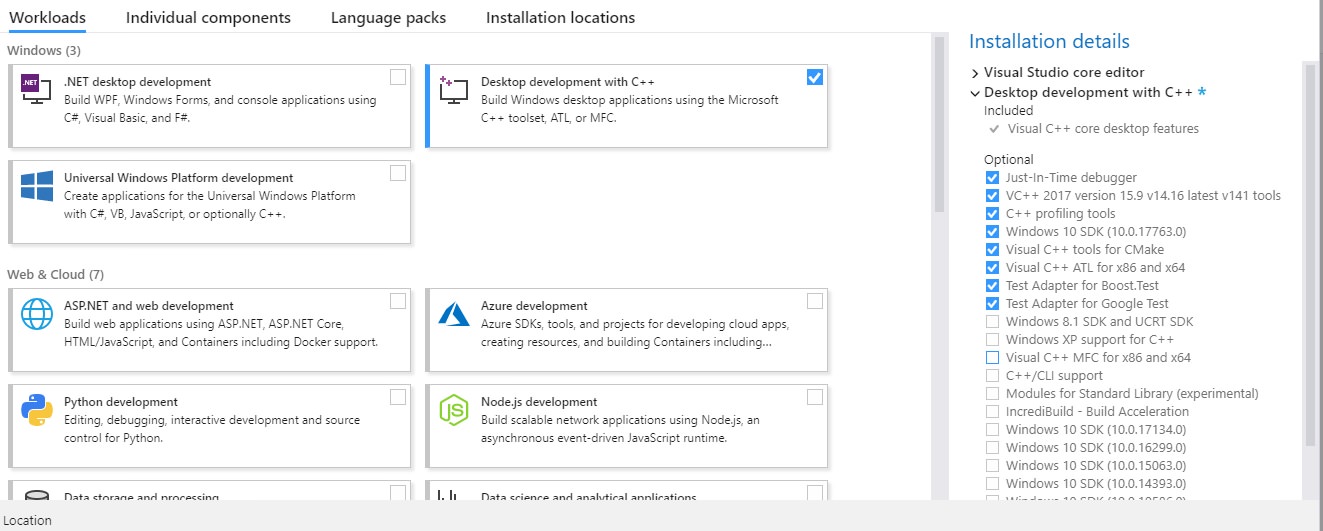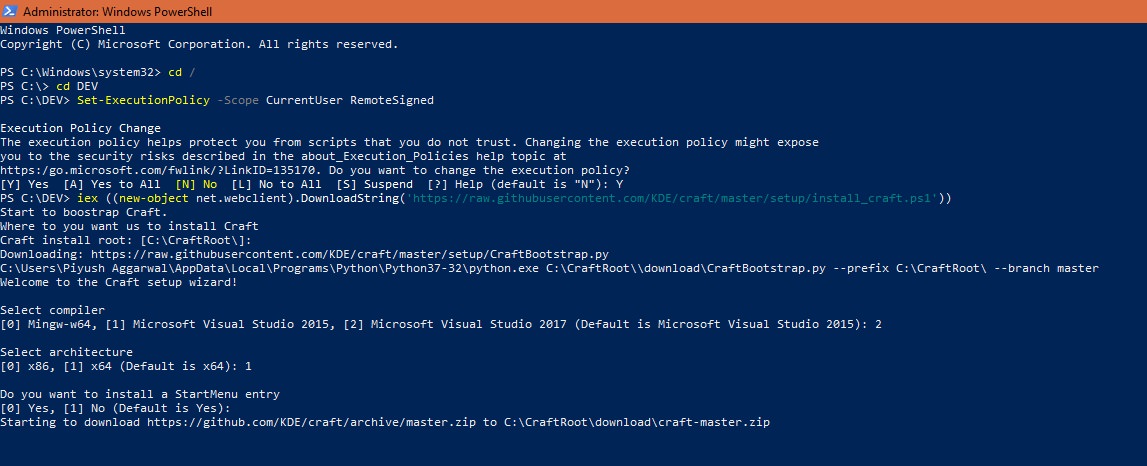KDEConnect/Build Windows
NOTE: We recommend to install Craft in C:/ [default]
0. SETTING UP ENVIRONMENT
The environment for KDE Connect on Windows simply consists of two parts- A compiler of choice and a build system. While we do have a couple of options for the compiler, our recommended build system is Craft. While this is an all-in-one build guide, you should definitely refer to Craft's documentation for further information on using the build system in your development environment!
Choose your compiler of choice:-
MSVC (full-support) | MinGW-w64 (partial support)
0.1 Installing MSVC
1. Install Visual Studio 2019 (Community) from here and select Desktop development with C++.
2. Install these packages.
- Just-in-Time debugger
- VC++ 2019 version
- C++ profiling tools
- Windows 10 SDK
- Visual C++ tools for CMake
- Visual C++ ATL for x86 and x64
- Test Adapter for Boost.Test
- Test Adapter for Google Test
0.2 Installing MinGW-w64
1. Install MinGW-w64 through the GUI installer located here.
2. While installing Craft, feel free to select Mingw-w64 as your compiler!
Afterwards, there is no difference in the commands used in the development. Note that due to the lacking of some definitions in MinGW provided header file, some plugins could not be compiled with all functions on Windows using MinGW.
This is still an experimental feature, and you might need some developer know-how to get past any build problems.
0.X Installing Craft
1. Call the following commands in a Powershell window with Administrator Privileges
Set-ExecutionPolicy -Scope CurrentUser RemoteSigned
iex ((new-object net.webclient).DownloadString('https://raw.githubusercontent.com/KDE/craft/master/setup/install_craft.ps1'))
2. During command 2, select the default (Visual Studio 17 if you chose MSVC earlier, otherwise Mingw-w64) as your compiler.
Select compiler [0] Mingw-w64, [1] Microsoft Visual Studio 2017, [2] Microsoft Visual Studio 2019 (default is Microsoft Visual Studio 2017): 1 Select architecture [0] x86 [1] x64 (Default is x64): 1
3. When installation is done, note the Environment variables to match the ones in top of this image:-
[Environment] PATH= Craft : C:\CraftRoot Version : master ABI : windows-msvc2017_64-c1 Download directory : C:\CraftRoot\download
1. BUILDING KDE CONNECT OUT OF LATEST SOURCE CODE
Craft has automated most of the redundant parts of the build process and exposed just the really useful parameters like which version to build, where to install et al.
1. Open Craft CraftRoot from search (in taskbar).
2. Run the following commands now.
REM First, we set the version of kdeconnect-kde to be installed to the master branch. craft --set version=master kdeconnect-kde REM Now we install kdeconnect-kde within CraftRoot. craft -i kdeconnect-kde
3. BUILDING A SHARE-ABLE INSTALLER
Choose your package of choice:-
.EXE Setup (full-support) | .Appx package for Windows Store (partial support)
3.1 creating a desktop application .exe setup
0. Make sure PackageType is set as PackageType = NullsoftInstallerPackager in CraftRoot/etc/CraftSettings.ini.
1. To create an installable setup, you need NSIS- a open source system to create Windows installers. Install it by this command: craft nsis
3.2 creating a Windows App .Appx package
0. Make sure PackageType is set as PackageType = AppxPackager in CraftRoot/etc/CraftSettings.ini.
3.X Packaging through Craft
1. Now you can use the --package flag to build an installer. Run this in Craft CraftRoot.
craft --package extragear/kdeconnect-kde
Note: The output files are saved here: C:\CraftRoot\tmp\
FAQs : Frequently Asked Questions
We are only human! There are many doubts that we face commonly, during DevSprints and during onboarding of new contributors. We'd like to expedite this process for you by enlisting all the commonly asked questions in one place so you don't have to ask around like others had to!
1. I see double plugins in my installed KDE Connect. How do I fix it?
Simple! Just rename your CraftRoot/ folder to something different. Even CraftRoot1/ will work! It's the design of the Craft-made packages that force installed applications to look in CraftRoot/ for the plugins first and then into their own installation folder.
2. I don't get the notification buttons, and the application name in the notifications is weird (something like kdeconnect.daemon. How do I fix it?
Again, Simple! Just run this command, and you should be golden.
C:\CraftRoot\bin\SnoreToast.exe -install "KDE Connect DEV" "C:/CraftRoot/bin/kdeconnectd.exe" "kdeconnect.daemon"
A detailed explanation is available on my blog here and also in the code of SnoreToast backend for KNotifications here.
3. How can I contact you? I'd like to talk to the team about an issue/ suggestion.
- Telegram: You can find a link to our Telegram group here.
- IRC on Freenode: #kdeconnect
- Mailing List: https://mail.kde.org/mailman/listinfo/kdeconnect
- email ID: [email protected]
Be sure to tell us if you got stuck somewhere in the process of setting up the developer environment. You can mail us. Yes we read the mails! 😜




